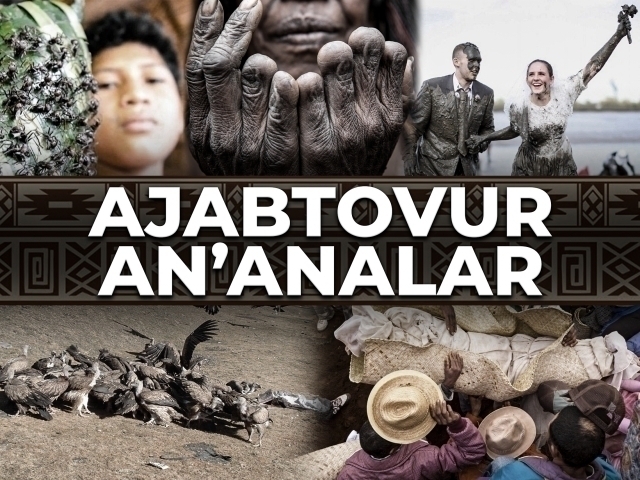Strange and surprising traditions from around the world
Interesting
−
09 February 2025 16763 7 minutes
There are millions of customs, traditions, and rituals of millions of people in the world. Naturally, an important tradition for the inhabitants of one region may seem strange to those from another region. Today we will get acquainted with some traditions or customs of several peoples that are surprising from each other.
A Woman Who Lost a Loved One Also Loses Her Finger
For the women of the Dani tribe living in Indonesia, losing their loved ones brings not only emotional but also physical pain. The fact is that when a loved one dies, the women of this tribe are forced to cut off one of their fingers. The tradition of cutting off half of the finger is intended to appease the spirit of the deceased.
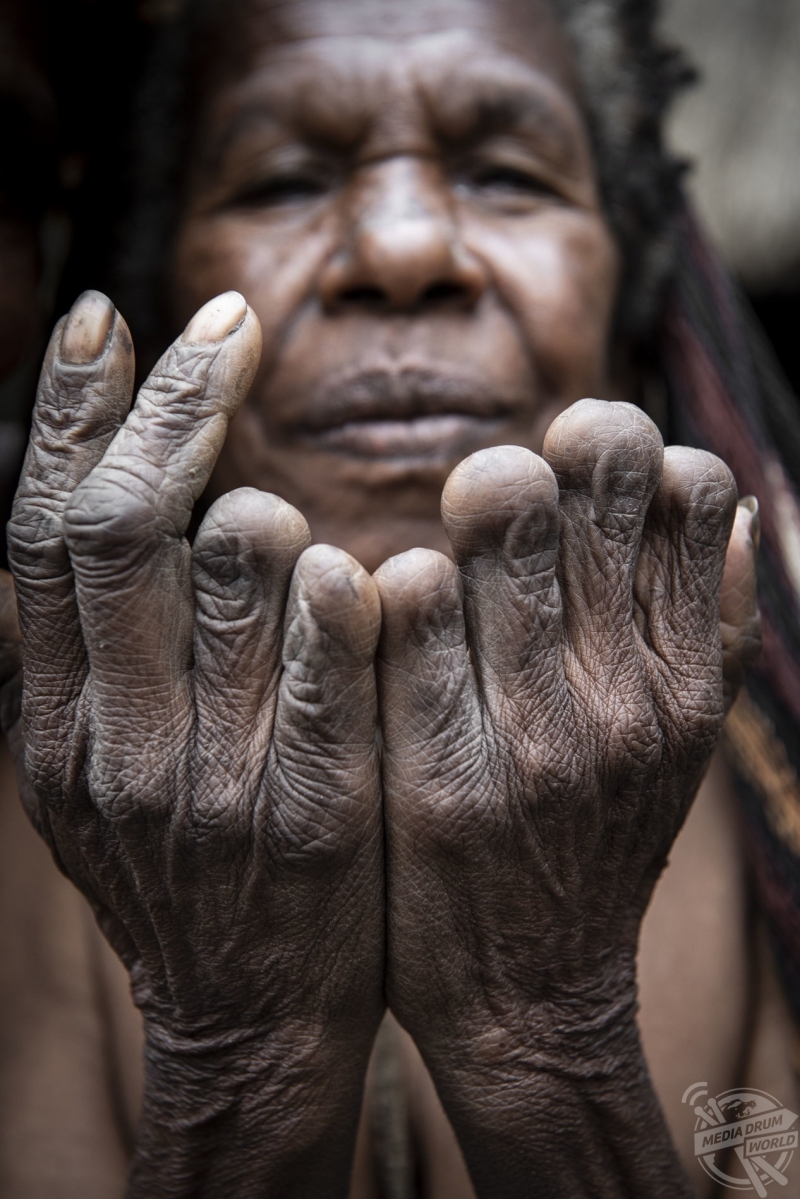
Typically, the finger is cut off with a sharp stone or tied tightly with string, which causes the finger to turn black and rot due to lack of blood and soon falls off. After the finger is removed, the open wound is cauterized to stop the bleeding, and the severed part is either burned or buried in a special place. A woman's fingers are cut off for every close relative who has died. It is possible to witness the fact that older women in the tribe are missing several fingers. In addition, in the Dani tribe, although the fingers of newborn babies are not cut off, their mothers bite them hard, believing that this will bring them good luck. The Indonesian government has banned such actions, considering them torture, but the 250,000-strong tribe remains faithful to their traditions.
Ten Painful Minutes to Grow Up
In some cultures, children's coming of age is celebrated with special ceremonies. In some cultures, children, especially boys, are put through a difficult ordeal and are required to overcome it and prove that they have grown up. For example, in the Satere-Mave tribe of Brazil, boys have to endure a terrible ordeal in a ceremony of transition to manhood when they turn 12.
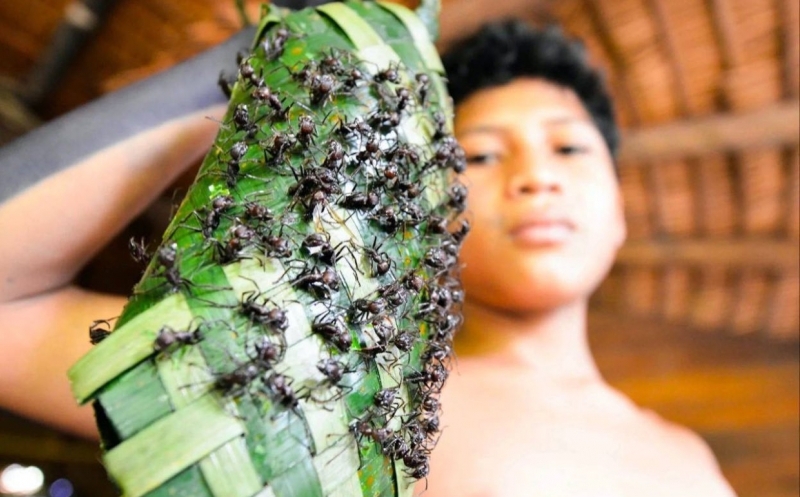
The fact is that children have to put their hands in a bag filled with arrow ants and endure it for 10 minutes. This can make even the bravest child tremble with fear. Because the pain of an arrow ant sting is the most acute of all insects - 30 times stronger than a bee sting.
Garbage is Thrown on the Bride and Groom
A wedding is a special day for people all over the world. These include ceremonies such as henna, fatiha, and sangeet. For example, in Scotland, the bride and groom are congratulated in the most disgusting way before the wedding.
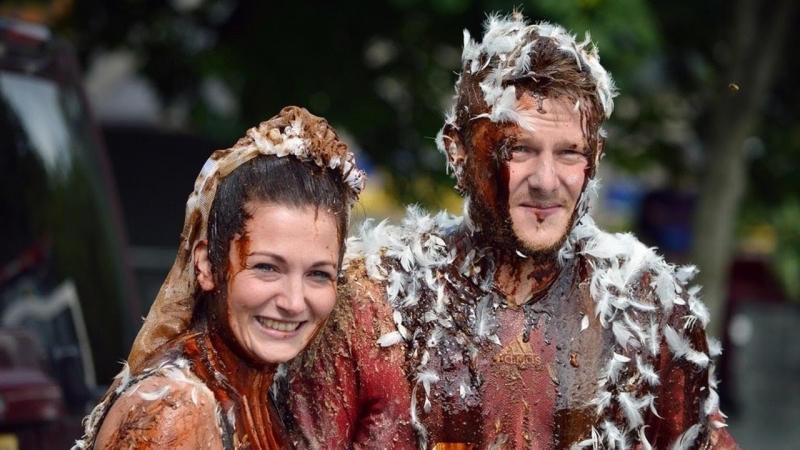
The fact is that after the engagement, family, and friends pour and throw various things on the bride and groom. Often this can be mud, eggs, flour, oil, food scraps, gasoline, and even animal waste. Local authorities are not happy with this tradition, because usually after fun, the polluted place and waste are thrown away. This can spoil the taste of tourists.
Donating Corpses to Vultures
Funeral ceremonies are held differently in different parts of the world. For example, in Korea, the body is cremated and the ashes are stored in special containers. And the Indians throw such ashes into the river. The Chinese place the deceased in a coffin and hang it up high to protect them from predators. Tibetans, on the other hand, have a slightly more brutal burial method. This funeral is by Buddhist traditions, in which the body is returned to the earth and fed to sacred vultures, a way of giving back to nature. Moreover, Tibetans believe that once the soul has departed, the body has no meaning.
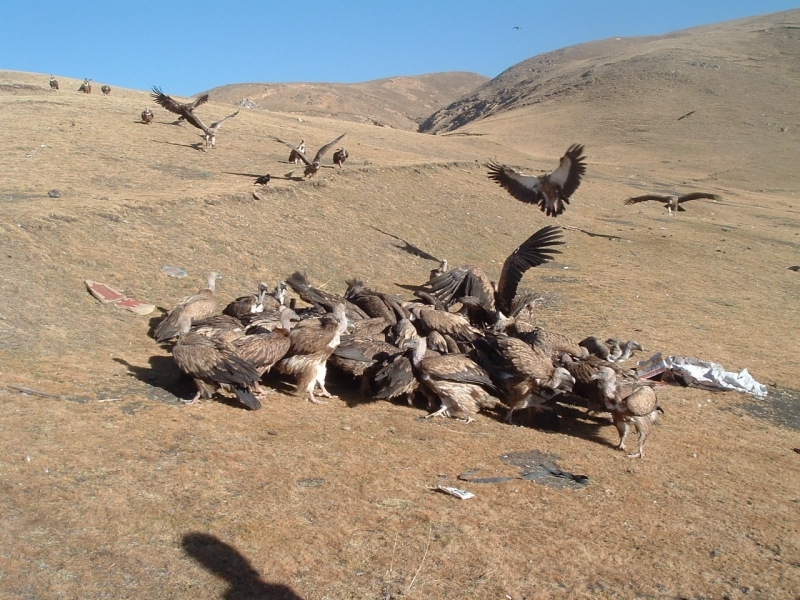
Traditionally, the deceased is kept in a sitting position for several days while monks pray. The ceremony is held in an uninhabited highland to be closer to the sky and attract birds. The undertakers cut the body into small pieces and prepare it for the birds to eat. The remains and bones left by the vultures can be burned or buried. Fun fact: the birds quickly devour the body, which means that the deceased lived a good life. This funeral is well-received by some because of its environmental benefits.
Exhuming a Corpse and Telling the News is a Sign of Respect
One of the tribes living on the island of Madagascar has such a custom that it makes you wonder which rituals it is included in. The fact is that this ceremony, called Famadihana, is held a year after the deceased is buried. It appeared in the 17th century among the Merina and Betsileu mountain tribes. The roots of the ceremony go back to the belief that the bodies of people who held important positions in society during their lifetime were worshiped. Actions taken to deify deceased tribal leaders later became a tradition. Over time, when ordinary tribal members died, their relatives began to pay them the same respect.
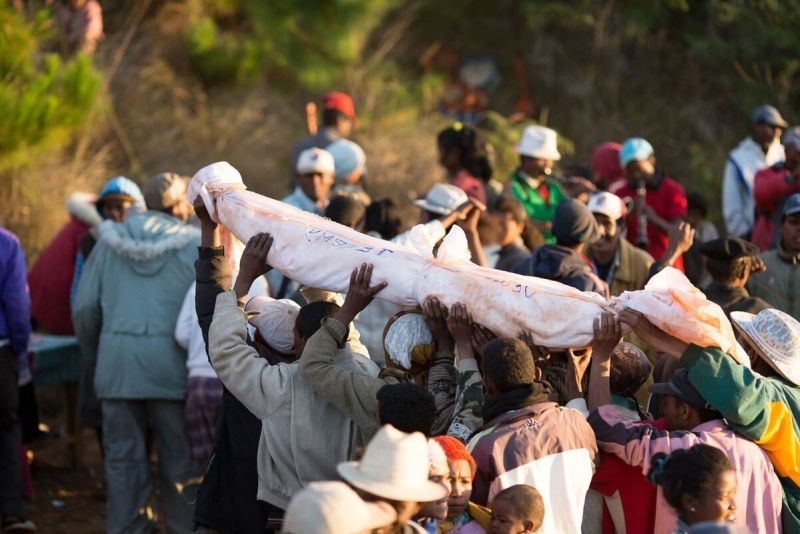
Famadihana is based on the concept that the deceased are intermediaries between the gods and the living. During the ceremony, people pray to the spirits of their ancestors, just as they pray to a god. According to tribal beliefs, a person passes to the next world only after the body has completely decomposed, and before that, the deceased must communicate with family members. During the Famadihana, people remove the body of a close relative from the grave, carry it on a mat, and shroud it in new silk cloth. During the ceremony, it is forbidden to put the body on the ground, say its name, or point to it. Also, each person asks the ancestor for health, wealth, and children, and talks about the news that has happened in the family and the country since his death. In addition, musicians and actors are invited to the ceremony, and a lavish feast is organized for relatives. The Famadihana lasts several hours, and at the end of the ceremony, the deceased is buried in a new grave. The ceremony is repeated every seven years. Recently, this ceremony has been held less often. This is partly due to the high costs, and partly due to the opposition of some Christian organizations.
The Devil Jumping Over Babies
Even developed countries continue to follow the traditions and strange customs of their ancestors, no matter how illogical it may seem. For example, in the modern European country of Spain, there is a tradition of jumping over babies.
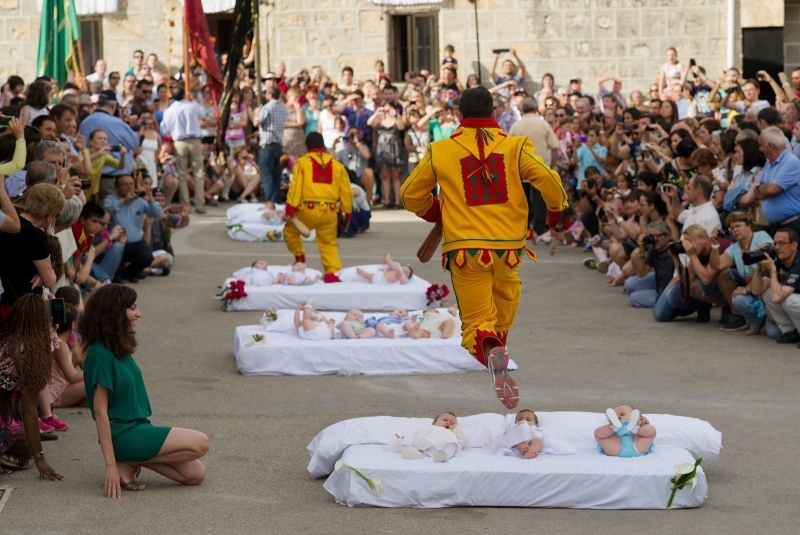
This ceremony, which has a four-century history, is held as part of a four-day festival. During the El Salto del Colacho ceremony, which means “the devil’s jump,” people dressed in the clothes of the devil, as imagined by the Spaniards, attack those around them with whips made of horsetail in their hands, chasing children. At the end of such performances on the streets, the “devil” jumps over babies lined up. This is done in an attempt to absolve them of their sins and protect them from future illnesses. The annual festival ends with a feast that includes music and dance.
It can be said that people who live mainly in tribal forms view the customs passed down from their ancestors not as mere traditions, but as a real duty. In modern states, however, whether it makes sense or not, the customs of their ancestors are interpreted as national values.
Live
All40 gektar maydonda Yangi Jizzax shahri quriladi
03 February
Erdo'g'an Saudiyaga bordi
03 February
Putin “qora shahzoda” bilan telefonlashdi
03 February
Qashqadaryoda YPX mashinasi yonib ketdi
03 February
